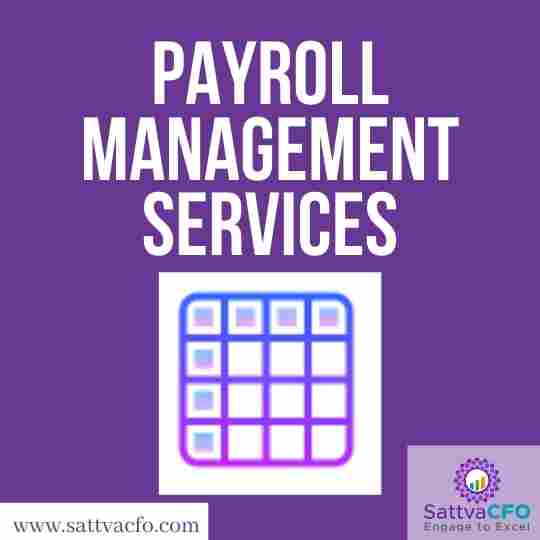Payroll management is the process of keeping track of an employee’s earnings, wages, net pay, tax deductions, incentives, and other statutory duties like PF and ESI (Employees’ State Insurance). Employees are paid on time with an effective payroll management system, which reflects well on the company’s financial stability and eliminates the risk of legal implications. As a result, employee morale is still excellent! A payroll administration system is required by every firm, whether small, medium-sized, or large-scale.
Payroll Management Services
Checklist for an Effective E-Payroll System
Documents for the Company:
- Electronic Challan cum Return (ECR) document
- Company GST and TIN
- Certificate of Registration
Schedule of Payments:
A schedule that is both flexible and rigid:
Weekly, twice a week
- Payroll schedules are available on a semi-monthly and monthly basis.
- Employees should be classified in the following ways:
- Sort employees into groups based on their job functions.
Freelancers and Contractors
Interns are permanent employees, and payments are made according to a schedule.
Compensation terms:
To keep track of
- Working hours in the office
- Overtime, for example.
Benefits of SattvaCFO’s Payroll Management System
Payroll Management is the process of keeping track of an employee’s earnings, wages, net pay, tax deductions, incentives, and other statutory duties like PF and ESI (Employees’ State Insurance). Employees are paid on time with an effective payroll management system, which reflects well on the company’s financial stability and eliminates the risk of legal implications. As a result, employee morale is still excellent! A payroll administration system is required by every firm, whether small, medium-sized, or large-scale.
A effective payroll process necessitates a reliable payroll system that conforms with both payroll and labour laws. Some of the advantages of SattvaCFO payroll management solution include:
Improve employee morale:
If your employees believe their job is in jeopardy and they aren’t getting paid on time, they may look for work elsewhere. Any last-minute issues or manual errors will be handled by a Payroll Management system, ensuring that your employees’ morale remains high.
Lower tax bills:
Keeping track of all of your employees’ paperwork can be tough, and misplacing them can be disastrous. When you add in compliance difficulties, you may find yourself paying fines if you aren’t attentive.
Simple tax filing and reporting:
Payroll software protects employees from tax mishandling, which could result in penalties. It also takes care of all of the company’s regulatory and compliance concerns, making tax filing a snap.
New startup owners will benefit from this:
As a new startup owner, you will already have a lot on your plate. Instead of adding payroll management to your to-do list, you can now use established management software to keep track of your company’s money.
Payroll software is often intended to operate with an existing accounting system, making it cost-effective and time-saving. When calculating big amounts of data, this saves time and money for businesses. Keeping your payroll in-house instead of outsourcing it will save you a lot of money. You’ll have more financial power as well.
FAQ
What are the tax deductions allowed by law?
IT (income tax), EPF (employee provident fund), TDS (tax deducted at source), and ESI (Employees’ State Insurance) are examples of statutory deductions that are deducted according to the individual’s annual compensation and state legislation.
What are some of the advantages and benefits that employers/companies provide to their employees?
Medical reimbursements, health insurance, paid vacations, leave encashment programmes, and wellness programme financing are all frequent benefits that corporations provide. Earned leaves; social security benefits such as ESI, PF, pensions, group insurance plans, maternity benefits; payment of gratuity, and so forth are statutory benefits prescribed by law. These advantages vary based on the sort of business and the state in which it is located.
What are the benefits of outsourcing my payroll?
Managing accounting, payroll, taxes, and other financial responsibilities is time-consuming and difficult, especially if your company is new. As a result, outsourcing the payroll process allows you to save time and money while also ensuring accuracy in calculations and deductions. You may also benefit from expert advice from payroll specialists as well as accounting and financial professionals.
Is payroll handled by human resources or by accounting?
Both the HR and the finance departments are responsible for payroll.
Who is in charge of payroll?
The payment is prepared by the accounting department and is subject to approval by the agency’s head or representative. Because they maintain track of employee attendance and overtime, the payroll is created by the human resource department.
Payroll Glossary
Earnings from Payroll
Employees are compensated in the form of numerous wage components such as base pay, house rent allowance, sales incentives, and so on.
Deductions from Payroll
The amount removed from an employee’s income (or earnings) by the employer for items like government taxes and employee benefit programmes is known as payroll deductions.
Pay that fluctuates
Variable pay, often known as pay for performance or risk pay, is a sort of income that must be earned every time, as opposed to fixed pay. Variable compensation is not guaranteed and is only paid if specific qualitative or quantitative targets are met by individual employees, teams, or the organisation.
Company Expenses (CTC)
The overall cost of monetary and non-monetary benefits that a business pays to an employee over the course of a year is known as the cost to company.
Minimum Wage
The first and most important component of your salary structure is your basic salary, or basic pay, and many other salary components, such as HRA, Provident Fund, Gratuity, ESIC, and so on, are determined as a percentage of basic pay. Provident fund contributions, for example, are withdrawn from salaries at a rate of 12% of basic pay.
Allowance for Travel While on Leave (LTA)
Leave travel allowance, also known as leave travel concession, is a compensation component that employers give in employees’ CTCs to help them save tax on money spent travelling inside India while on leave.
Allowance for Medical Treatment
Medical allowance is a defined amount of money sent by an employer to an employee in the form of a monthly wage, and employees are not obliged to provide any documentation in order to get it.
Paying Bonuses
Incentive pay is a bonus paid to employees for meeting pre-determined goals or targets, and it is directly tied to an employee’s job performance.
Salary in Gross
A gross salary is the whole amount of money paid to an employee by a corporation before any deductions.
Average Weekly Wage
The ultimate payment that you get in your bank account is known as take-home pay, in-hand salary, or net pay (or through cheque or cash).
Paid Time Off
Paid leaves are vacations from work during which you are paid your regular wage.




